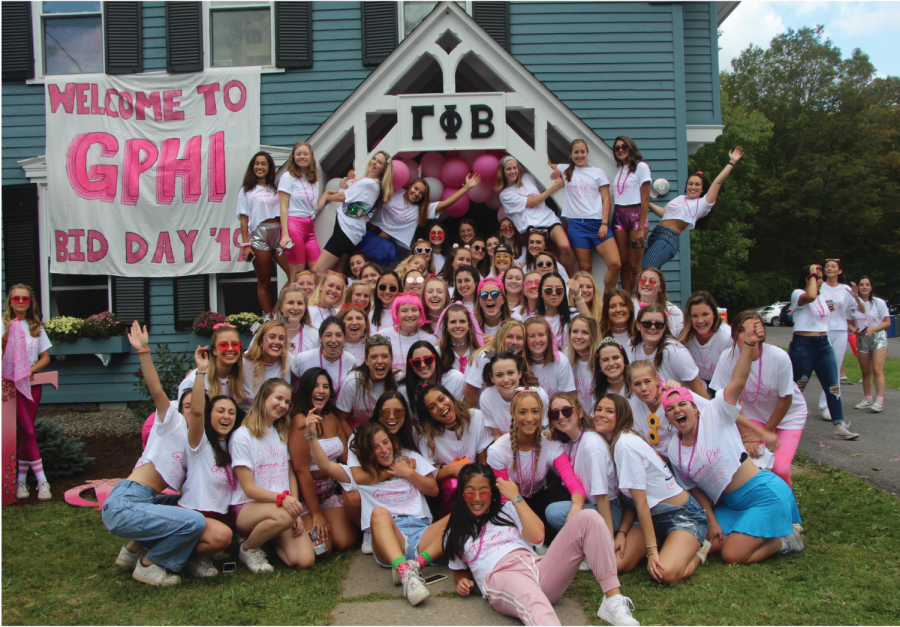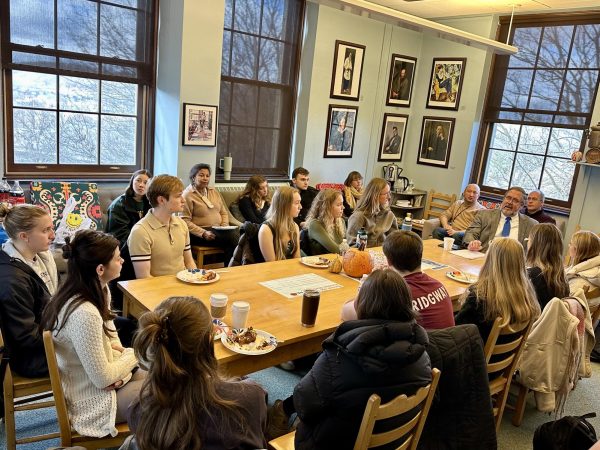Colgate Greek Life Welcomes New Members
The Colgate Panhellenic Council and the Interfraternity Council held recruitment for the eight sororities and fraternities on campus last week from September 10-15. Sophomores and juniors with a GPA of at least 2.5 were considered eligible to participate in the sorority and fraternity recruitment process. There are five fraternities at Colgate, including Beta Theta Pi, Delta Upsilon, Phi Delta Theta, Phi Kappa Tau and Theta Chi. The sororities represented at Colgate consist of Delta Delta Delta, Gamma Phi Beta and Kappa Kappa Gamma. All Greek Life organizations on campus have houses located along Broad Street. The Interfraternity Council (IFC) governs Colgate’s fraternities and the College Panhellenic Council governs Colgate’s sororities.
Fall recruitment involves events hosted by each fraternity and sorority house, where prospective new members (PNMs) socialize with existing members in hopes of receiving a bid and joining one of the Greek organizations on campus.
For Panhellenic sororities, the events included Panhellenic and Sisterhood Night, Philanthropy Night and Preference Night, according to the Panhellenic Recruitment Manual sent to all students eligible for recruitment. Panhellenic recruitment included a new financial transparency presentation at each house on Friday night, in order to more effectively communicate to potential new members the costs of joining a sorority.
“I am here to answer all of [PNMs’] questions about the process [and] to help them organize their thoughts and figure out which chapters best align with their values and interests.
After each chapter deliberates and determines their own prefences, I inform each PNM in my group about which chapters they have been invited back to,” junior Annica Knowles said regarding her role as a sorority recruitment counselor.
The Interfraternity Council’s recruitment included a night of house tours, various house-specific themed events throughout the week, including the well-known “Bash the Buick,” hosted by Phi Delta Theta and Phi Kappa Tau’s “McDonald’s Feast.”
The recruitment process for both sororities and fraternities ended Sunday, September 15 with Bid Day, where new members were offered bids to officially join Greek organizations. Kappa Kappa Gamma and Gamma Phi Beta welcomed pledge classes of 68 new members, and Delta Delta Delta gained 56 women in their chapter. Delta Upsilon took 22 men, as did Phi Delta Theta, Theta Chi 21, Phi Kappa Tau 24 and Beta Theta Pi welcomed 17 new fraternity members.
Junior Fiona Grove, a member of the Delta Delta Delta sorority, said she feels both excited and stressed as an existing sorority member.
“[Recruitment] is definitely long and pretty tiring on the other end of it. Talking to five to six girls per time slot is fun in some ways, but exhausting in others,” Grove said.
Junior Cole Grumbach, a member of the Delta Upsilon fraternity, explained how recruitment looked for his fraternity.
“I’m really happy with how recruitment went. This year, there was the addition of a second night of events for each fraternity to host, which helped us really get to know the guys going through recruitment. The entire process was pretty well organized,” Grumbach said, “Now, having been both a prospective member and recruitment chair, I understand how much work goes into the
process on both sides,” Grumbach said.
Colgate has a long history of Greek life. Starting in the 1850s, fraternities began to emerge out of all-male literary societies. When women were allowed to enroll at the university in 1970, sorority chapters were soon established — Gamma Phi Beta became the first sorority on campus in 1981, according to the chapter’s website.
Grove said that in spite of the stress, she feels that participating in Greek life has positively affected her Colgate experience thus far.
“Being affiliated is one of the best ways to meet new people and form new friendships,” Grove said. “It sounds silly, but just having one thing in common — your affiliated organization — you’ll have more than a hundred girls who feel like they have some kind of connection to you on campus.”








